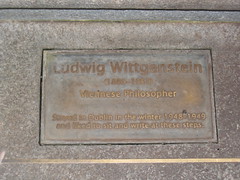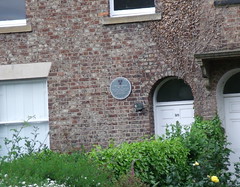Ludwig Wittgenstein
Commemorated on 6 plaques
Ludwig Wittgenstein 1889-1951 philosopher - engineer - architect - artist. Lived here at 76 Storey's Way. 'Do not agree with me in particular opinions but investigate the matter in the right way. To notice the interesting things....that serve as keys if you use them properly'
76 Storeys Way, Cambridge, United Kingdom where they lived
Ludwig Wittgenstein (1899 -1951) Viennese philosopher stayed in Dublin in the winter 1948 - 1949 and liked to sit and write at these steps.
The Greenhouse, National Botanic Gardens, Botanic Road, Glasnevin, Dublin, Ireland where they liked to sit and write at these steps (1948-1949)
Ludwig Wittgenstein 1889 - 1951 philosopher lived and worked here November 1948 - June 1949
Ashling Hotel, Parkgate Street, Dublin, Ireland where they lived (1948-1949) and worked (1948-1949)
Ludwig Wittgenstein 1889 - 1951 philosopher lived and worked here April 1948 - Oct. 1948
Killary Harbour Youth Hostel, Killary Harbour, Rosroe, Ireland where they lived (1948) and worked
28 Brandling Park. Ludwig Wittgenstein 1889-1951. One of the most influential thinkers of the twentieth century lived here in 1943 while working at the Royal Victoria Infirmary.
28 Brandling Park, Newcastle upon Tyne, United Kingdom where they lived
Ludwig Wittgenstein, 1889 - 1951, pre-eminent Viennese philosopher & mathematician, worked incognito at Guy's Hospital pharmacy as drugs porter and ointment maker, 1941 - 1942. Memorial donated by Guy's John Fry Group 2013.
Counting House Lodge, Guy's Hospital, Collingwood Street, Southwark, London, United Kingdom where they worked (1941-1942)






